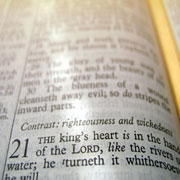

Custom Search
Are we Living in the Last Days...End Times? See Breaking News |
 |
| __________________________ |
 |
________________________ |
| ________________________ |
As You Study the Biblical Last Days in the News... Discover the Bible As Well |
 |
| ________________________ |
 |
| ________________________ |
 |
| ________________________ |
To Know God's Word Read Scripture |
 |
_______________________ |
To Read God's Word Your Reading Schedule |
 |
_______________________ |
 |
| _________________________ |
Thought Provoking Articles for Your Meditation |
 |
_______________________ |
A. Superiority of the Way of Wisdom |
|
|---|---|
Proverbs 1:1-7 introductions |
|
Reason for the book is given. |
|
Proverbs 1:8-9:18 The Righteous Woman, Wisdom Versus the Evil Woman |
|
Proverbs 1:8-19 First instruction of a father to his son with respect to ways of wisdom is given. |
|
Proverbs 1:10-19 Good advice is given…shun evil companions; avoid violence. |
|
Proverbs 1:20-23 Lady Wisdom speaks, invites all to come to her. |
|
Proverbs 1:24-33 The fool's rejection of Lady Wisdom is tantamount to rejecting God. |
|
Proverbs 2 A Wisdom Poem |
|
Proverbs 2:1-5 Wisdom needs to be sought. |
|
Proverbs 2:6-8 Wisdom is also God's gift. |
|
Proverbs 2:9-22 The protection of Wisdom is told. Wisdom will keep one safe from the way of evil and from the loose woman. Wisdom enables one to walk in the way of good men. |
|
Proverbs 3:1-4 Do not forget the teachings. Obey the words; reap the benefits. |
|
Proverbs 3:5-12 Trust in the Lord, in both prosperity and adversity. |
|
Proverbs 3:13-20 Wisdom Hymn: Happy is the man who finds Wisdom and does not let it go. |
|
Proverbs 3:21-35 Wisdom gives advice on being a good neighbor. |
|
Proverbs 4:1-9 Wisdom at home. Pay close attention to teachings. |
|
Proverbs 4:10-27 Two choices are available to all. Life is a road. One can choose way of righteous or way of wicked. |
|
Proverbs 5:1-14 All should beware of the Seductress. She is persuasive and dangerous. Unclear whether prostitute, adulteress, or foreign woman is meant. |
|
Proverbs 5:15-23 Remember your wife. Best antidote against adultery: stay in love with your wife. Keep romance in your marriage. |
|
Proverbs 6:1-5 Do not underwrite someone else's debt. |
|
Proverbs 6:6-11 A parable based on the ant, addressed to the sluggard. |
|
Proverbs 6:12-15 Beware of troublemakers and scoundrels. |
|
Proverbs 6:16-19 Six things the Lord hates. |
|
Proverbs 6:20-35 Warning against adultery. Foolish behavior has extreme consequences. |
|
Proverbs 7 Beware the Adulteress |
|
A vivid description of a temptress is told. Poem filled with imagery of terrible fate awaiting the fool. Warning against falling for the ways of a temptress. |
|
Proverbs 8 A Contrast Between Wisdom and Folly |
|
Proverbs 8:1-3 Wisdom calls out her voice. |
|
Proverbs 8:4-11 Wisdom appeals for all to listen. |
|
Proverbs 8:12-21 Wisdom sings her own praises. |
|
Proverbs 8:22-31 Wisdom is an attribute of God. Wisdom pre-existed the creation of the world. |
|
Proverbs 8:32-36 Wisdom addresses "her sons". Exhorts them to "listen". |
|
Proverbs 9 The Personification of Wisdom and Folly |
|
Proverbs 9:1-6 Wisdom builds her house. |
|
Proverbs 9:7-12 Interpolated verses contrasting wise and insolent man. |
|
Proverbs 9:13-18 Description of Woman Folly's house. Contrasts two ways, two choices. |
|
B. Main Collection of Solomon's Proverbs |
|
Proverbs 10-22:16 Contrasting and Parallel Proverbs |
|
A series of two-line sayings that are mostly unrelated and complete in themselves is given. Each one could stand on its own merits. With very few exceptions, they are written in antithetic parallelism, wherein the second line contrasts the first. They cover a wide range of conduct. Some of these seem totally unreligious to us, but given the unity of the book, they are still presented as the wise words that “Lady Wisdom” imparts. (Hence the importance of reading chapters 1-9 first.) Though efforts to discern units within this collection have not been too successful, scholars are unwilling to conclude that these are merely haphazard sayings. Sometimes the same topic will be addressed for several verses. Sometimes the placement of a saying enhances the meaning within a larger group. Chapters 10-12 seem to place considerable emphasis on just/wicked sayings. Chapters 13-15 emphasize wise/foolish terminology. 15:33-16:11 have a preponderance of The Lord’s sayings, while 16:10-15 focus on the king. Beyond this, there is simply no agreement as to subunits within the collection. Chapters 17-22 are a group of miscellaneous sayings, one right after another, ending with a series of proverbs on rich/poor. |
|
C. Words of the Wise |
|
|
Proverbs 22:17- 24:22 Thirty Wise Sayings |
|
These proverbs are quite distinct from those previously discussed in that they are all longer, appear in couplets, and are addressed to young men. Instead of antithetical parallelism, these are written as admonitions, usually accompanied by the reason for it. Salient topics include warnings against gluttony and intoxication, admonitions to not envy the wicked, how to be an obedient son, and the oft-repeated refrain to "fear the Lord". |
|
D. Words of the Wise-Appendix |
|
Proverbs 24:23-29 Proper behavior in the law courts is mentioned. |
|
Proverbs 24:27 Parable on having things in order is recounted. |
|
Proverbs 24:28 Rules for giving evidence in court are given. |
|
Proverbs 24:29 Condemnation of taking revenge is expounded. |
|
Proverbs 24:30-34 A teaching story on the consequences of laziness is told. |
|
E. Proverbs of Solomon as Compiled by Hezekiah's Men |
|
Proverbs 25-29 There is a considerable difference between the first three and last two chapters of this section. The first three chapters have virtually no mention of God, but they do have many similes and metaphors, but there are many admonitions. The last two chapters are the exact opposite, leading some scholars to think these were originally two separate sections. Now, however, the title delineates these five chapters as one whole. They are distinctive also, in that they are linked to a specific period of time, having been "copied" by Hezekiah's men. |
|
Proverbs 25:1 The heading is made. |
|
Proverbs 25:2-7 Many sayings about kings are given. |
|
Proverbs 25:8-28 A series of comparisons is delineated. |
|
Proverbs 26:1-12 Discussion of the fool is made. |
|
Proverbs 26:13-16 Discussion of the lazy man (sluggard) is told. |
|
Proverbs 26:17-28 Disparate proverbs involving wicked, foolish behavior are described. |
|
Proverbs 27 Some scholars see in this chapter a manual for the king…how to treat his subjects. But mostly they are again miscellaneous comments, unrelated to each other. |
|
Proverbs 28 Proverbs of antithetic parallelism. Mainly these involve ethical issues; the just and wicked are contrasted. |
|
Proverbs 29 Proverbs involving a wide range of topics, including parent/child relationships are told. |
|
F. Appendices |
|
Proverbs 30 The Words of Agur |
|
Nothing more is known about this man, Agur. He speaks in the first person and acknowledges he knows little. One can only know what God has given to him. |
|
Proverbs 30:1-3 The Introduction of Agur: An admission is given that he knows little. True wisdom is described as knowing what you don't know. |
|
Proverbs 30:4-6 Five questions are posed. Rhetorical questions are used to underscore the great divide between God and man. |
|
Proverbs 30:7-9 Prayer is prayed for having neither too much nor too little in life. |
|
Proverbs 30:10-14 A collection of sayings is told. Don't dishonor parents; do not be arrogant; do not eat up the poor. |
|
Proverbs 30:15-33 Numerical sayings: Include marvels of nature and human relationships, the effects of small things. Admonition against foolishness and disobedience of parents is told. |
|
Proverbs 31:1-9 Words of Lemuel |
|
These are words of Lemuel's mother given to him, the king of Massa (thought to be an area in North Arabia, but otherwise unknown). This is the only occasion of instruction given by a mother. Emphasis on social responsibility is given. An admonition to avoid women and wine is given. |
|
Proverbs 31:10-31 – The Virtuous Woman |
|
An acrostic poem, these verses extol the perfect, industrious woman whose husband is barely visible. This has led some to believe this was an idealized portrait of a woman who could not literally exist. Others see this as a fitting end to the book of proverbs…a masterful portrait of Wisdom. |
|
Proverbs 31:10-12 Introduction |
|
Proverbs 31:13-27 The body of the praise |
|
Proverbs 31:28-31 The conclusion urging praise |
|
|
|
|
© Copyright Nugget Net Review 2013. All rights reserved